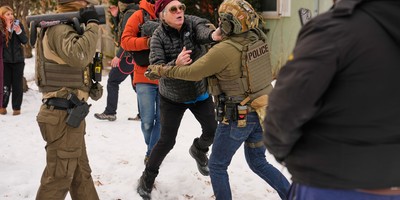When my father died several years ago, friends invited me to the Sabbath services at their synagogue. I looked forward to spiritual healing, and the rabbi kindly took note of my mourning. But his sermon was more political than religious. He talked of what was in the news, of Rev. Jesse Jackson declining the opportunity to repudiate the anti-Semitism of Louis Farrakhan, of civic responsibilities and of the then-campaign getting underway to select a new president.
Such reflection of political issues of the day in the synagogue, especially as they relate to anti-Semitism and Israel, is not unusual. But I felt cheated. I wanted reinforcement of faith, a meditation on the mysteries of mortality -- not ruminations on politics and prejudice. Jews, like many Christians, are familiar with politics from the pulpit, which is sometimes all for the good. But politics from the pulpit can reside uneasily inside a religious message.
Many preachers, priests and rabbis are strong and eloquent in support of civil rights, adding powerful voices for change and justice, galvanizing their congregations to do good -- to confront the evil in their midst. But as we have seen in recent days, it's not unusual for legitimate grievances to become, with encouragement from the pulpit, hatred of whites, even of the nation itself. Unfortunately, hatred galvanizes, too.
When Mitt Romney addressed the issue of his Mormon faith, he spoke of the legitimate need to ask about the religious faith of those who seek the presidency, of the way faith has shaped who they are: "Does he share these American values: the quality of human kind, the obligation to serve one another and a steadfast commitment to liberty?"
That's why Barack Obama's speech last week was such an important event. With the hundreds of thousands of Americans having been treated to excerpts from Rev. Jeremiah Wright Jr.'s vicious sermons, circulating furiously across the Internet, it was crucial for the senator to let everyone know how he heard and responded to them.
Recommended
While the speech put Sen. Obama firmly on the side of the better angels of our nature, condemning his pastor's race-baiting and masterfully calling for a change in the racial dialogue, it left several lingering questions: Why would he want his two daughters of tender and impressionable years to be exposed to his pastor's rhetoric virulent anti-Americanism? If Sen. Obama moves into the White House, would the pastor, a friend and mentor, visit him there? Would he ask the preacher to disavow his poisonous accusations that the U.S. government "invented" the HIV virus as a means of genocide against people of color?
The senator's juxtapositions to his condemnation of his pastor's incendiary racism made it of a piece with the deeply hurtful description of his grandmother's fear of black men passing her on the street. (Rev. Jesse Jackson once confessed to similar fears.) Sen. Obama's feelings for his grandmother offer painful insight into his psychology. We can hardly imagine how difficult it was for him as a multiracial boy to hear his white grandmother suggest that when he grew up, he would be the kind of man who would frighten her. How ironic he chose a spiritual mentor whose tirades no doubt would have frightened her, too.
Obama deftly quoted William Faulkner's famous remark that the past is not dead because it isn't even past. But the reference was misplaced. The past when a black man was considered three-fifths of a person for purposes of allocating congressional seats is definitely dead, and buried. The past when black men and women were denied the right to vote is definitely dead and buried. The past when all Americans were required to pay a poll tax to vote is definitely dead, and buried. The past when restaurants, restrooms and schools were segregated by law is definitely dead, and buried.
He was correct in observing that Jeremiah Wright and millions of other black Americans came of age when segregation was still the law of the land and widely practiced even in places where it was not the law. But it's important to observe that they, like the rest of us, have also matured if not necessarily mellowed in the four decades since the Civil Rights Movement turned things upside down and inside out, putting them aright.
There will always be more to do in order to create that elusive "more perfect union," but it's important for spiritual -- and political -- leaders to remind us that social conscience has sometimes done its work, that some things in the past are definitely dead, and buried.

























Join the conversation as a VIP Member